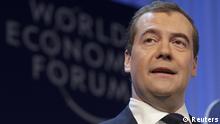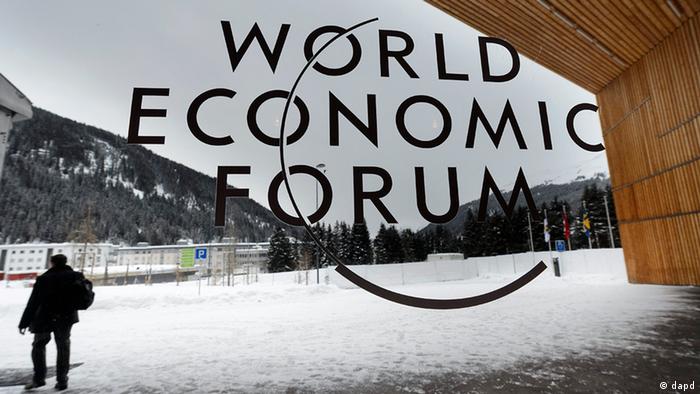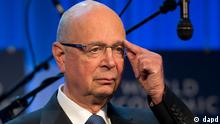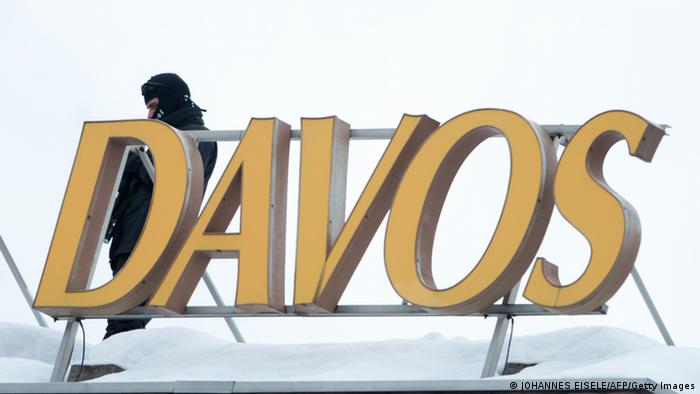The World Economic Forum (WEF) in Davos, Switzerland, has committed itself to "improving the state of the world." Once a year, entrepreneurs, politicians and scientists debate about how this can be achieved.
Experts from around the globe meet in Davos to discuss the world's most pressing issues. This year marks the forum's 43rd annual meeting. Last year, people here were rather pessimistic as they feared a crisis-ridden Europe would cause the eurozone to break apart. Such a break-up was regarded as almost inevitable. Much has happened since: Greece got partial debt relief, members of the eurozone set up new bailout funds and the European Central Bank (ECB) pledged it would "do whatever it takes" to save the euro.
The economic situation has since eased somewhat. The imminent threat of losing the eurozone's single currency seems to be banned. And this year's motto in Davos reflects the change in mood: "resilient dynamism."
"I hope you do leave this meeting with a vision that goes beyond dealing with crises," Klaus Schwab, WEF's founder and president, said in his opening statement addressing some 2,500 visitors.
Prominent visitors
The most prominent players dealing with Europe's debt crisis have not arrived in Davos yet, but are scheduled to speak at the conference in the next couple of days. Among the speakers are German Chancellor Angela Merkel, Italian Prime Minister Mario Monti, ECB President Mario Draghi and IMF director Christine Lagarde.
 Medvedev was one of the first keynote speakers
Medvedev was one of the first keynote speakers
Russia currently chairs the Group of 20, the world's 20 biggest industrial and emerging countries, and has been prominently featured in Davos. Prime Minister Dmitry Medvedev was among the first speakers on Wednesday and numerous panel discussions center around Russia's current economic situation.
Many countries - among them Nigeria and South Africa - have sent their top-notch politicians, says Borge Brende, member of the WEF's managing board. "Some 50 heads of state and government are expected at this year's WEF," he said. That trumps even last year's numbers, he added. What's more, some 350 ministers and government representatives and members of NGOs are set to arrive in Davos as well - among them UN chief Ban Ki-moon.
Google canceled this year's meeting
Entrepreneurs from a wide selection of industries and countries meet up in Davos as well. Membership fees of 34,000 ($45,000) up to 400,000 ($530,000) euros paid by about 1,000 companies are the main source of funding for the forum. But search engine Google which used to send representatives to the meeting has canceled its participation for this year's summit without giving any reason.
However, a study by auditing company PricewaterhouseCoopers (PWC) doesn't fit this year's optimistic and dynamic rhetoric. According to the PWC study presented on the night before the WEF kicked off, the number of CEOs who said they would be "very optimistic" about future prospects has declined. The number of optimistic bosses was significantly higher in the two previous years.
 The annual World Economic Forum presents a chance for people to meet and exchange ideas
The annual World Economic Forum presents a chance for people to meet and exchange ideas
European entrepreneurs were especially pessimistic - only 1 in 5 still was confident. "It doesn't come as a surprise that CEOs are less optimistic now than they were 12 months ago, considering problems such as excessive bureaucracy, public debt and instable capital markets," PWC head Dennis M. Nally said.
Whatever the mood, the forum presents an opportunity for people to exchange ideas. And, of course, it's a great way of promoting one's company - to get investors on board, to acquire new customers, or to drum up support for a good cause.
Just like South African actress and Oscar winner Charlize Theron who was awarded a prize for her fight against HIV/AIDS. "Subsaharan Africa alone accounts for two thirds of all HIV deaths worldwide," Theron said. Even though science had made progress in treating and preventing AIDS, "this fight is far from over;" she added.
Vanity fair?
 Schwab wants participants to leave Davos in a more optimistic state
Schwab wants participants to leave Davos in a more optimistic state
Despite all these prominent figures, they won't be able to come up with a binding agreement since both organizers and participants have not been given a mandate. That's why the forum often gets accused of doing little other than helping promote managers and politicians - in a sense, being a vanity fair.
Of course that's part of it, says WEF's Schwab, but it goes beyond that. His hopes for the economic summit this year are that "every participant will be more optimistic, more resilient and more passionate than before [coming to Davos]. And that they get a better sense of what is going on in the world." dw de

Comments